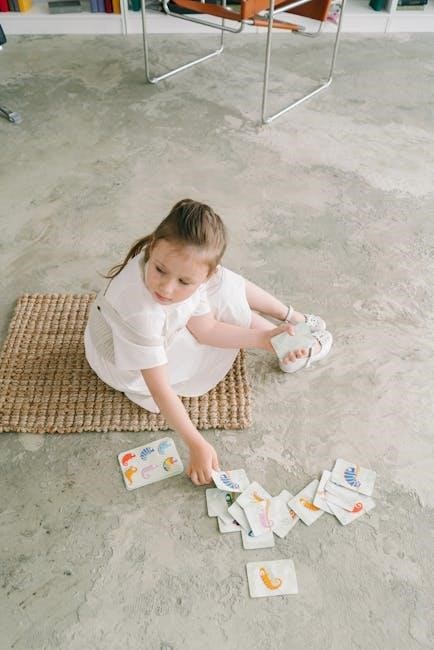Play therapy is a powerful tool helping children express emotions and process experiences. It uses guided play to foster healing and growth, supported by activities from PDF resources.
What is Play Therapy?
Play therapy is a therapeutic approach where children use play to communicate and process emotions. It is facilitated by a trained therapist, allowing children to express feelings and experiences through activities like art, imaginative play, or structured exercises. Play therapy activities, often provided in PDF handouts, are designed to help children address emotional or behavioral challenges. By engaging in play, children can explore their thoughts, develop coping strategies, and improve their overall well-being. This method is particularly effective for young children, as play is their natural language, making it an accessible and non-threatening way to heal and grow.
The Importance of Play in Child Development
Play is a cornerstone of child development, fostering emotional growth, social skills, and cognitive development. Through play, children explore their world, learn problem-solving, and develop self-regulation. Play therapy activities, often shared in PDF resources, provide structured tools to enhance these benefits. Play helps children express emotions, build resilience, and establish healthy relationships. It serves as a natural language for kids, allowing them to navigate challenges and thrive. By incorporating play into daily routines, parents and therapists can support children’s holistic development, laying a strong foundation for their future well-being and success.
How Play Therapy Helps Children Process Emotions
Play therapy empowers children to explore and understand their emotions in a safe environment. Through guided play, kids can express feelings they struggle to articulate. Activities from PDF resources provide structured interventions, helping children process trauma, anxiety, or grief. Play allows them to act out emotions, gaining clarity and control. Therapists use these tools to foster emotional awareness, teaching healthy coping mechanisms. This process builds resilience, enabling children to manage challenges effectively and develop a positive emotional foundation for lifelong well-being.

Types of Play Therapy Activities
Play therapy offers various activities like traditional play, PCIT, and Theraplay, supported by PDF resources for structured interventions and emotional healing.
Traditional Play Therapy
Traditional play therapy emphasizes a non-directive approach, allowing children to lead sessions using toys and materials. It fosters emotional expression and healing through spontaneous play, guided by trained therapists. This method is supported by various PDF resources, offering structured activities that help children process their experiences naturally. By providing a safe space for self-directed play, traditional therapy helps kids build resilience and understand their emotions better, making it a cornerstone of many therapeutic practices.
Parent-Child Play Therapy (PCIT)
Parent-Child Play Therapy (PCIT) strengthens the bond between parents and children through guided play. It involves coaches helping parents engage in therapeutic play to improve communication and emotional connection. Activities from PDF resources, such as Filial therapy, are often used to create meaningful interactions. PCIT empowers parents to become active participants in their child’s emotional healing, fostering a supportive environment for growth and understanding. This approach is particularly effective in enhancing parent-child relationships and promoting long-term emotional well-being for children.
Theraplay Techniques
Theraplay techniques focus on enhancing the parent-child relationship through structured, playful activities. These interventions, often detailed in PDF resources, emphasize physical touch, emotional connection, and clear communication. Theraplay helps children develop trust and security by engaging in activities like nurturing, playfulness, and boundary-setting. Parents are guided to create a safe environment, fostering their child’s emotional growth. This approach is effective in addressing attachment issues and behavioral challenges, promoting healthy development through meaningful interaction and play-based therapy techniques.

Benefits of Play Therapy
Play therapy fosters emotional expression, builds resilience, and improves behavior in children. It strengthens parent-child bonds, promoting healthy development through engaging, structured activities.
Improving Emotional Expression
Play therapy enhances children’s ability to express and manage emotions through creative activities. Using tools like art, imaginative play, and structured exercises from PDF resources, children can convey feelings non-verbally. This fosters self-awareness and emotional regulation, helping them process complex emotions in a safe environment. Guided by therapists, these activities empower children to communicate effectively, reducing emotional distress and promoting mental well-being. The therapeutic powers of play create a natural outlet for emotional expression, making it easier for children to articulate their inner experiences.
Enhancing Parent-Child Relationships
Play therapy strengthens parent-child bonds through collaborative activities, fostering empathy and understanding. Techniques like Filial therapy and Theraplay encourage joint play, promoting positive interactions. Parents learn to support their child’s emotional needs, creating a nurturing environment. Structured exercises from PDF resources guide parents in facilitating play, enhancing communication and trust. These activities help parents respond sensitively to their child’s feelings, fostering a deeper connection. Play therapy empowers parents to become active participants in their child’s emotional growth, leading to stronger, more resilient relationships and a supportive family dynamic;
Building Social Skills in Children
Play therapy activities, such as imaginative play and group interactions, help children develop essential social skills. These exercises encourage cooperation, empathy, and communication. Structured games from PDF resources guide children in practicing roles and resolving conflicts, fostering teamwork. Play therapy also enhances self-awareness and emotional regulation, crucial for positive social interactions. By engaging in therapeutic play, children learn to understand others’ perspectives, share, and build friendships. These skills are foundational for healthy relationships and lifelong social success.

Play Therapy Activities for Emotional Healing
Play therapy activities, such as art-based exercises and imaginative play, help children process emotions and experiences. These structured interventions, often detailed in PDF resources, promote healing and growth.
Art-Based Play Therapy
Art-based play therapy engages children in creative activities like drawing and painting, helping them express emotions non-verbally. Supported by PDF resources, these exercises guide therapists in fostering emotional expression and healing. Through art, children can process difficult experiences, develop self-awareness, and build resilience. This approach is particularly effective for those who struggle with verbal communication, providing a safe space for emotional exploration and growth.
Imaginative Play for Emotional Processing
Imaginative play allows children to explore emotions through pretend scenarios, fostering emotional processing and self-expression. Guided by PDF resources, therapists use activities like role-playing or storytelling to help children navigate complex feelings. This approach enables kids to reenact experiences, gain insight, and develop coping strategies. By engaging in imaginative play, children can express emotions they may struggle to articulate verbally, creating a safe space for healing and growth. These activities, supported by structured interventions, empower children to process emotions effectively and build resilience.
Structured Interventions for Trauma
Structured interventions in play therapy provide a safe framework for children to process traumatic experiences. Using PDF resources, therapists guide activities like therapeutic games or art-based exercises to help children confront and heal from trauma. These interventions are designed to promote emotional regulation, reduce anxiety, and rebuild trust. By incorporating evidence-based techniques, play therapy offers a child-centered approach to trauma recovery, allowing children to express their feelings and experiences in a controlled and supportive environment. These activities are tailored to individual needs, fostering resilience and aiding in the journey toward healing and emotional well-being.

Play Therapy Exercises for Behavioral Improvement
Play therapy exercises help children address behavioral challenges through structured activities. These exercises, often detailed in PDF guides, foster emotional regulation and improve the parent-child connection;
101 Play-Based Exercises for Behavior
101 Play-Based Exercises for Behavior offers a comprehensive guide to improving children’s emotional regulation and conduct. These activities, detailed in free PDF resources, are designed to address specific behavioral challenges through engaging, age-appropriate play. Each exercise is structured to promote self-awareness, self-control, and positive interactions. From art-based tasks to imaginative role-playing, these interventions help children develop essential life skills. The exercises are adaptable to individual needs, making them versatile tools for therapists and caregivers. By fostering a supportive environment, these play-based strategies empower children to manage emotions and behaviors effectively, leading to healthier relationships and personal growth.
Strengthening the Parent-Child Connection
Play therapy activities, such as Filial and Theraplay, are designed to enhance the parent-child bond. These structured interventions, often detailed in PDF handouts, encourage joint play and emotional validation. Parents learn to create a supportive environment, fostering trust and communication. Activities like shared art projects or imaginative games help parents understand their child’s emotional needs. These tools, available in free downloadable resources, empower caregivers to promote healthy development. By engaging in play together, families build stronger relationships, improving emotional resilience and connection, which are essential for long-term well-being and mutual understanding.
CBT-Informed Play Activities
CBT-informed play activities integrate cognitive-behavioral techniques into play therapy, helping children identify and manage negative thoughts and behaviors. These activities, often detailed in PDF resources, encourage children to process emotions through structured games and art. For example, “thought bubbles” in art therapy allow kids to visualize and challenge negative thoughts. Storytelling and role-playing also help children practice problem-solving skills. Free downloadable worksheets from sources like Child Therapy Guide provide evidence-based tools for therapists. These activities foster emotional resilience and self-awareness, aligning with CBT principles while maintaining the engaging nature of play therapy, making them effective for children’s mental health support.

Adapting Play Therapy for Children with Disabilities
Adapting play therapy involves tailoring activities for children with disabilities like Autism Spectrum Disorder, Cerebral Palsy, and Down Syndrome. PDF resources offer structured interventions to support these needs.
Play Activities for Autism Spectrum Disorder
Play therapy for children with Autism Spectrum Disorder focuses on structured, engaging activities to enhance communication and social skills. Techniques like imaginative play and art-based exercises help children express emotions and connect with their environment. Sensory integration activities, such as tactile play, are particularly effective. PDF resources provide therapists with practical tools, including visual schedules and activity guides, to support these interventions. These activities foster independence, emotional regulation, and cognitive development, tailored to each child’s unique needs. Play therapy offers a safe, non-verbal space for children with ASD to thrive and grow.
Engaging Children with Cerebral Palsy
Play therapy for children with cerebral palsy focuses on adapting activities to meet their unique physical and developmental needs. Techniques include tactile play, motor skill exercises, and sensory integration to enhance engagement. Adaptive tools and assistive devices are often incorporated to ensure accessibility. Structured play helps improve coordination, strength, and emotional regulation. Activities like art-based play and imaginative exercises foster creativity and self-expression. PDF resources provide therapists with detailed guides for designing inclusive play interventions. These approaches promote independence, confidence, and overall well-being, tailoring play to each child’s abilities and preferences for a meaningful therapeutic experience.
Play Therapy for Down Syndrome
Play therapy for children with Down syndrome emphasizes tailored activities to enhance cognitive, social, and emotional growth. Techniques include sensory integration, interactive games, and imaginative play to stimulate development. Adaptive tools and visual aids are often used to facilitate understanding and engagement. Activities like art-based exercises and structured interventions help build communication skills and self-confidence. PDF resources provide therapists with specific play-based strategies to address individual needs. These approaches foster a nurturing environment, promoting independence and joy while supporting the unique developmental journey of each child with Down syndrome through engaging and meaningful play experiences.

Telehealth Play Therapy Activities
Telehealth play therapy uses virtual sessions and digital tools to engage children remotely. PDF handouts and interactive activities help therapists facilitate emotional processing and maintain child engagement online.
Virtual Play Therapy Sessions
Virtual play therapy sessions connect therapists and children remotely, using digital tools to maintain engagement. Activities like drawing or storytelling are shared via PDF resources, ensuring continuity of care. These sessions adapt traditional play therapy techniques for online platforms, allowing children to express emotions and process experiences in a familiar digital environment. Therapists can guide activities in real-time, fostering emotional healing and behavioral growth. This approach ensures accessibility and convenience while preserving the therapeutic benefits of play, making it a valuable option for modern mental health support.
Using PDF Resources in Telehealth
PDF resources are integral to telehealth play therapy, offering structured activities that guide sessions. Therapists share PDF handouts with parents or children, outlining exercises for emotional processing. These documents often include art-based prompts, imaginative play scripts, and behavioral interventions. Parents can print or view them digitally, ensuring consistency in therapy. PDFs also provide visual aids, helping children engage with activities during virtual sessions. This approach enhances the effectiveness of telehealth, making play therapy accessible and convenient while maintaining therapeutic integrity and supporting children’s mental health needs remotely.
Interactive Activities for Online Therapy
Engaging children in online therapy requires innovative, interactive activities. Therapists use PDF resources to plan virtual play sessions, incorporating art, storytelling, and imaginative games. Activities like digital drawing or virtual scavenger hunts encourage participation. Parents are often involved, using shared PDF guides to facilitate play at home. These interactive approaches maintain children’s interest and emotional connection during telehealth sessions. By leveraging technology and structured play, therapists create meaningful experiences that promote healing and growth, ensuring therapy remains effective in a virtual setting.

Free Printable Play Therapy Resources
Access free printable PDF resources like Build It Prompts and Therapeutic Activity Worksheets. These tools offer evidence-based, engaging activities for children’s mental health and emotional growth.
PDF Handouts for Play Therapy
PDF handouts for play therapy offer structured, accessible tools for therapists and caregivers. They provide engaging activities to help children process emotions and experiences. These resources, such as Build It Prompts and therapeutic worksheets, are designed to support mental health through play-based interventions. Many handouts are evidence-based, incorporating techniques from CBT and art therapy. They are ideal for both in-person and telehealth sessions, offering flexibility and convenience. Compiled by experts like Nick Cornett, PhD, these PDFs include exercises for behavioral improvement and emotional healing. They are invaluable for fostering connection and growth in children.
Build-It Prompts for Play Therapy
Build-It prompts are creative tools used in play therapy to encourage children to express emotions through construction activities. These prompts, often included in PDF handouts, guide children to create structures that reflect their feelings or experiences. For example, building a “safe space” or a “bridge to happiness” helps process complex emotions. These activities are non-verbal and intuitive, making them accessible for children who struggle with verbal communication. Build-It prompts are versatile, suitable for individual or group therapy, and can be adapted for various developmental needs, including children with disabilities. They foster creativity and provide insight into a child’s inner world.
Free Therapeutic Activity Worksheets
Free therapeutic activity worksheets are invaluable resources for play therapy, offering structured exercises to support children’s emotional and behavioral growth. These PDF downloads, available online, provide engaging tasks that encourage self-expression, problem-solving, and social skills development. They often include art-based activities, emotional regulation techniques, and imaginative play prompts. Designed for both therapists and caregivers, these worksheets are adaptable to various needs, including children with disabilities. Many are informed by evidence-based approaches like CBT and art therapy, ensuring effectiveness. By leveraging these tools, adults can create meaningful play experiences that foster healing, connection, and growth in a child-centered environment.

Effective Techniques in Play Therapy
Effective techniques in play therapy, supported by PDF resources, provide structured interventions to help children process emotions and experiences through guided activities.
Easy-to-Implement Play Techniques
Easy-to-implement play techniques, such as drawing postcards or building prompts, offer simple yet effective ways to engage children in therapy. These activities require minimal setup and materials, making them accessible for therapists and caregivers. Guided by PDF resources, they provide structured interventions to help children express emotions and process experiences. Techniques like storytelling, pretend play, and art-based exercises are versatile and adaptable, allowing for customization based on a child’s needs. These methods foster a safe, creative environment where children can explore and heal naturally, supported by evidence-based approaches from play therapy PDF handouts.
Inexpensive Play Therapy Tools
Inexpensive play therapy tools, such as basic art supplies, household items, and DIY crafts, make therapy accessible without high costs. Items like paper, crayons, and cardboard boxes can be transformed into therapeutic resources. Many PDF handouts offer affordable activity ideas, such as drawing prompts or imaginative play scenarios. These tools encourage creativity and emotional expression, helping children engage in meaningful therapy without financial strain. Simple, everyday materials often provide the most effective ways to foster connection and healing, making play therapy accessible to all families and therapists.
Enjoyable Activities for Children
Play therapy offers a variety of enjoyable activities tailored to engage children, fostering both fun and emotional growth. Art-based exercises, imaginative role-playing, and structured games are popular choices. PDF resources provide detailed guides for activities like “Build It Prompts” and creative play scenarios. These activities encourage children to express themselves freely, building confidence and social skills. Interactive games and imaginative play help children process emotions in a safe, enjoyable environment. By integrating fun with therapy, these activities ensure children remain motivated and invested in their growth, making the therapeutic process both effective and delightful.

Training and Practice in Play Therapy
Play therapy training includes certifications like Registered Play Therapist (RPT) and specialized courses. Supervision and ongoing education ensure effective practice, supported by PDF resources and hands-on experience.
Registered Play Therapist Certification
Registered Play Therapist (RPT) certification is granted by the Association for Play Therapy (APT). It requires a master’s degree, supervised play therapy experience, and passing a certification exam. This credential ensures therapists possess the necessary skills and knowledge to effectively use play therapy techniques. Certification also demonstrates a commitment to ethical practice and ongoing professional development. RPT certification is essential for therapists seeking to specialize in play therapy, ensuring they can provide evidence-based interventions. Additionally, many resources, including PDF guides, support certified therapists in refining their practice and staying updated on effective play therapy strategies.
Supervision in Play Therapy Practice
Supervision in play therapy is a cornerstone of effective practice, ensuring therapists refine their skills and adhere to ethical standards. Supervisors provide guidance on case management, therapeutic techniques, and emotional support, helping therapists navigate challenging scenarios. Regular supervision fosters a deeper understanding of play-based interventions and enhances therapeutic outcomes. It also offers a safe space for therapists to reflect on their practices and receive constructive feedback. Supervision is particularly vital for new practitioners, aiding in the development of confidence and competence in delivering play therapy activities. Experienced supervisors help therapists stay updated on best practices, ensuring high-quality care for children.
Specialized Training for Therapists
Specialized training is essential for therapists to master play therapy techniques and effectively use resources like PDF handouts. These programs cover foundational theories, advanced interventions, and practical applications. Training often includes workshops on filial play, Theraplay, and trauma-informed care. Therapists learn to adapt activities for diverse needs, including autism and cerebral palsy. Courses emphasize evidence-based practices, ensuring therapists can design engaging and therapeutic play sessions. Continuous education helps professionals stay updated on innovative methods, enhancing their ability to support children’s emotional and behavioral growth through play. Such training fosters confidence and competence in delivering tailored play therapy activities.
Play therapy continues to evolve, with expanding resources like PDF handouts enhancing accessibility. Future directions focus on innovation, ensuring play therapy remains a vital tool for children’s emotional and behavioral well-being.
The Evolving Field of Play Therapy
Play therapy is advancing rapidly, with new techniques and resources emerging. The development of structured PDF handouts and Telehealth activities has expanded accessibility. Innovations in addressing diverse needs, such as autism and cerebral palsy, highlight adaptability. Research continues to validate play therapy’s effectiveness, ensuring it remains a dynamic and evidence-based practice. As technology and understanding grow, the field is poised to integrate more digital tools and culturally sensitive approaches, further enhancing its reach and impact on children’s mental health.
Expanding Play Therapy Resources
Play therapy resources are expanding to meet diverse needs, offering innovative tools for therapists and caregivers. Free PDF handouts, such as Build-It Prompts and therapeutic worksheets, provide structured activities for emotional healing. These resources support children with autism, cerebral palsy, and other disabilities, ensuring inclusive engagement. Telehealth-compatible materials, like interactive PDF activities, enhance accessibility for remote sessions. The growth of digital tools and downloadable guides empowers professionals and parents to facilitate meaningful play. As resources evolve, they bridge gaps in mental health support, making play therapy more accessible and effective for children worldwide.